For over eighty years, Maine Maritime Academy has been supplying the nation with skilled workers to meet our country’s engineering, management, science, and transportation needs. In an increasingly interconnected world, MMA students and alumni touch nearly every aspect of our modern global economy.
Over the decades, the Harold Alfond School of Engineering has gained a reputation for producing engineers of the highest caliber. Whether working at sea or ashore, MMA alumni are recognized as leaders, experts, and pioneers in their fields.
In 2018, the U.S. Bureau of Labor Statistics estimated a shortfall of at least six million engineers between 2016 and 2026. In the years since, geopolitical shifts, dynamic economic forces, and the Covid pandemic have converged to exacerbate workforce needs. Demand for skilled professionals has only increased.
In this ever-changing landscape, challenges and opportunities abound.
ATTRACTING AMERICA’S ENGINEERING WORKFORCE
According to the National Center for Education Statistics, the United States boasts approximately four hundred accredited engineering programs. Spread across all fifty states, these programs offer a variety of specializations and areas of focus. They all compete for the attention and interest of prospective students.
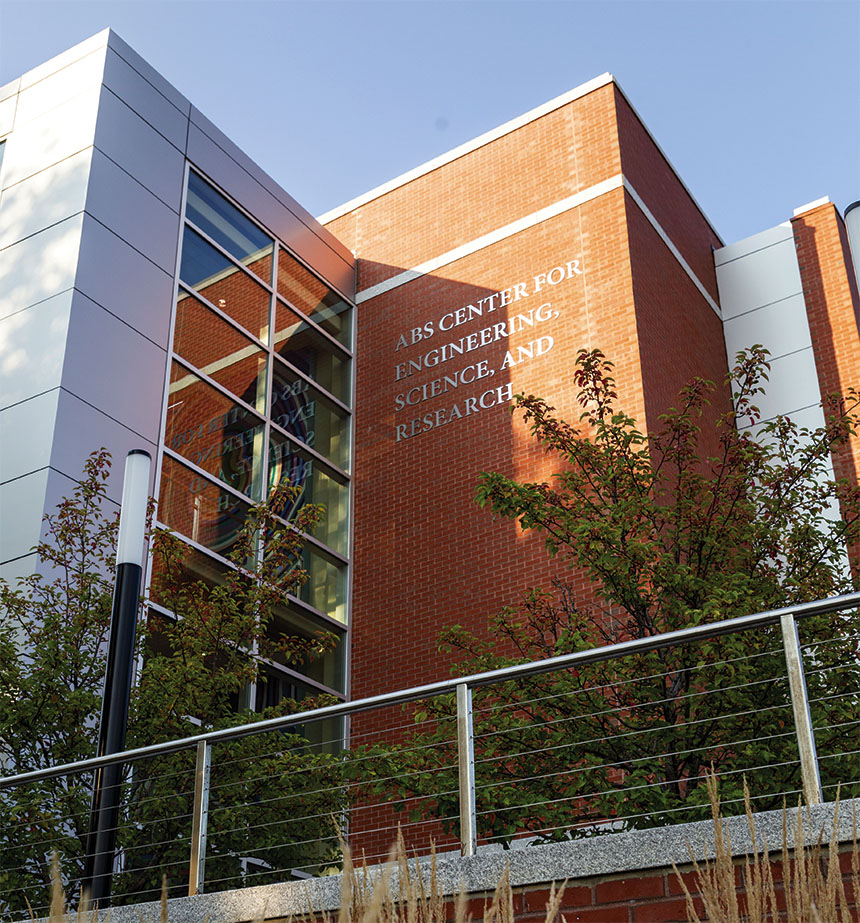
ABS Center for Engineering, Science, and Research
“You can find an engineering program anywhere,” says Kate Kana, MMA Director of Admissions. “What still sets the Academy apart is the experience that we can provide to students: our location, our small class sizes, and our hands-on learning opportunities.”
With five degree programs in engineering, including two that are accredited by the Accreditation Board for Engineering and Technology (ABET), students at MMA are afforded the unique opportunity to pursue a U.S. Coast Guard license and additional professional licensing opportunities for both maritime and shoreside careers. In a crowded educational landscape, this gives the Academy a unique edge and appeal.
“Students come here knowing that they’re learning more than a trade,” Kana emphasizes. “They’re developing a set of skills that will allow them to focus on what they want to do, and to be successful in whatever area of work that is.”
In addition, MMA’s engineering faculty offer diverse perspectives, blending academic backgrounds with industry experience. This allows students to approach their studies with a dual learning lens. “We often say, adds Kana, “that as a graduate you leave the Academy with classroom foundations, but also with muscle memory from having actually done the work.”
FOCUSED ON THE FUTURE
To maintain a competitive edge, the Engineering Department leverages the advice and expertise of the Harold Alfond School of Engineering Advisory Committee (AIC). The committee comprises alumni and stakeholders from a variety of industries, including the traditional energy sector and from shipbuilding industries. The committee monitors industry trends to help guide the direction of MMA’s curriculum.
“The IAC plays a vital role,” says Dr. Paul Wlodkowski. “Not only does the committee help ensure our curriculum is relevant, the committee is essential to our accreditation.
“Reliability engineering received an inordinate amount of support from the IAC,” continues Wlodkowski. “Thanks in part to the IAC’s enthusiasm, MMA now offers reliability engineering as part of its curriculum.”
Reliability engineering aligns with one of MMA’s core competencies: operations and maintenance. “Reliability engineering is a very specialized technical discipline that spans many industries,” Wlodkowski explains. “It’s associated with everything from quality control, quality assurance, safety, risk, and all forms of critical decision making.”
“Students come here knowing that they’re learning more than a trade,” Kana emphasizes. “They’re developing a set of skills that will allow them to focus on what they want to do, and to be successful in whatever area of work that is.”
Many of these skills are transferable, preparing students to work in manufacturing or facilities management, and increasingly with artificial intelligence, embedded sensors (the internet of things, or IoT), and increased quantification processes. “We need our students to be prepared so they are able to take their skills to the next level,” continues Wlodkowski. “These recent developments also coincide with the expected arrival of MMA’s new training ship. We’re still learning about what types of systems and sensors are already integrated in the vessel, but it is going to fundamentally change the way we teach. We have to be prepared for that.”
Last year, President Jerry Paul convened the MMA Nuclear Working Group with the goal of re-establishing the nuclear engineering minor. MMA is now offering the first in a number of nuclear engineering courses that will enable students to complete the minor, something that has not been possible since the 1990s. “This is a very prominent part of our curricular innovation,” Wlodkowski notes. “And we have had many times more interested students wanting to take the inaugural course than we had room for.”
Wlodkowski sees this evolution as a natural extension of MMA’s steam curriculum. “It’s precisely the steam, the result of the nuclear energy that is going into creating a carbon-free environment and helping solve the decarbonization of the oceans. This is a natural fit for the Academy, and few schools in the country have the infrastructure in place to impact the field like we do.”
SEIZING THE OPPORTUNITY
Growing up in southern Maine, Michael Perrault ’23, knew he wanted to enroll at MMA early on. Friends and family encouraged that goal, noting the quality of education, excellent career opportunities, and strength of the alumni body.
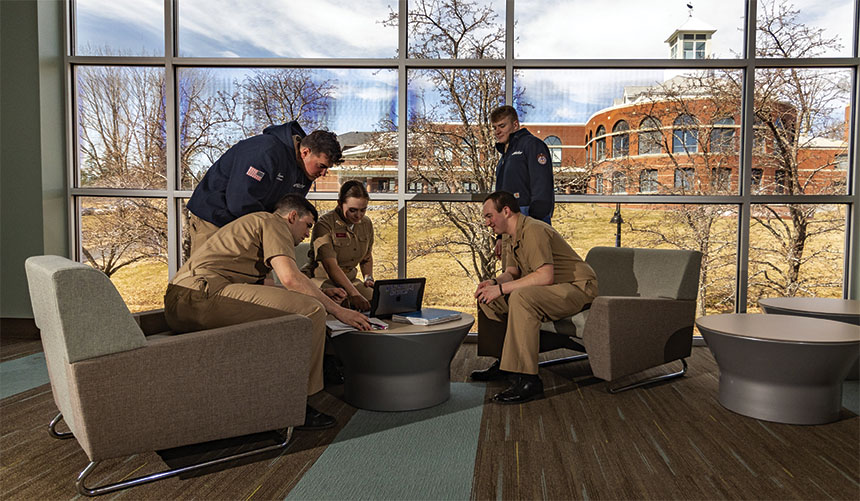
Students studying in the ABS Center.
A member of the Maine Army National Guard, Perrault arrived on campus in the spring of 2019 and found his footing in the Power Engineering Technology program. He took to his coursework quickly and found a particular interest in renewable energy. “I was always interested in that field, and I took several courses with Associate Professor Sadie Alley Ferreira ’03 that solidified what I wanted to do,” he explains.
“Professor Ferreira’s classes were tailored to current events and current industry practices,” Perrault continues. “I was excited about what I was learning. We talked about wind, solar, and storage; we covered nuclear; we learned about anaerobic digestion. We learned about all different kinds of renewable energy.”
In the end, the focus on nuclear engineering was transformative for Perrault. During his senior year, he met with representatives from NextEra Energy Resources at MMA’s annual Career Fair. Upon graduation, he moved to Wisconsin to become an Auxiliary Operator at the Point Beach Nuclear Plant.
Perrault soon understood the value of his education at the Academy. “It was immediately apparent to me just how much more prepared I was compared to my peers,” he says. “I have the tools I need to succeed, and I credit MMA’s curriculum, and the excellence of my professors, for giving me that.”
Perrault is quick to admit that he still has a lot to learn, but he is taking advantage of every opportunity he can to do so. This includes leaning on the expertise of fellow alumni, including Patrick Dunphy ’97, whom Perrault met upon his arrival at Point Beach. “What was drilled into me at MMA was to always be curious, to always be questioning,” says Perrault. “It was never about memorizing formulas or figures. You have to understand what you’re doing and why. That’s what sets you up to be a great teammate and problem solver.”
ENDURING INVESTMENTS
For Ferriera, who joined the Academy’s faculty in 2016, Perrault’s attitude exemplifies the goals of MMA’s engineering programs. “We pride ourselves on producing the type of engineers who can work well as a team and who can communicate their ideas clearly,” she says. “We want them to look at problems from many angles, to consider many elements, and to solve problems safely and creatively. We want them to be conscientious.”
To ensure students leave with a sense of confidence and preparedness, Ferreira and her colleagues work diligently to maintain a mindset of continual improvement. “Our outcomes assessment is designed to make sure we are looking at our courses, our programs, the department, and the institution in a way that ensures we’ll keep getting better.”
Part of their process involves adapting MMA’s program offerings to include state-of-the-art learning opportunities. This summer, a new SimGenrics simulator was installed. The simulator has a gas turbine generator and steam turbine generator set. It is modeled after the GE Mark VI software and has options for both water-cooled and air-cooled condensers. Courses leveraging the updated software will be launched this spring.
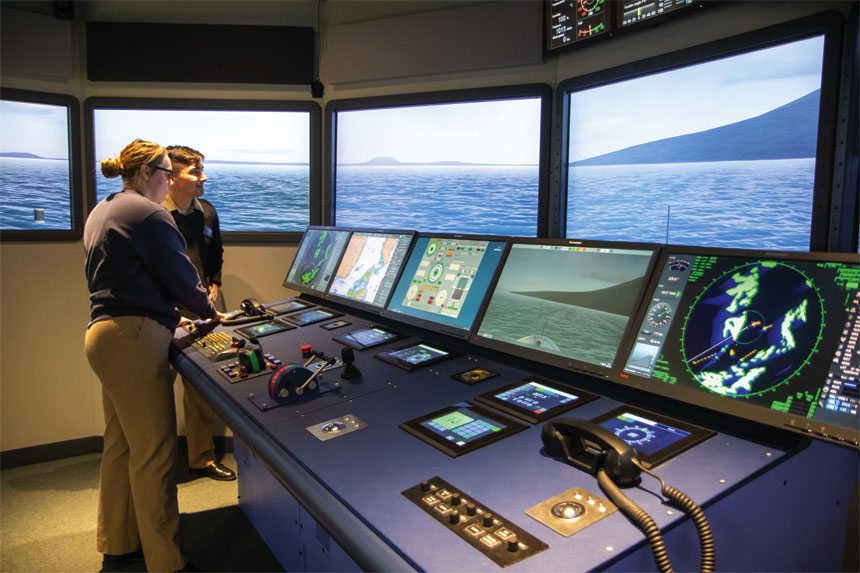
Students utilizing the simulator for hands on learning.
Ferreira considers all of this an investment in the Academy’s capacity and infrastructure, in today’s students, and in the future of the engineering program’s growth. “One of the things I’m really looking forward to,” Ferreira says, “is having students I’ve taught come back to the Academy and share their expertise and experience by serving on the IAC. We need their perspective to keep our perspective. We need them to stay current. To have them give back in that way is so important.”
SIGHTS SET ON TOMORROW
While honoring a legacy of excellence that is generations in the making, MMA continues to grow in response to our changing times. The Academy is uniquely situated to equip students with skills that will allow them to excel in career opportunities that exist today, and well into the future. “We need to help them prepare for jobs that are yet to be created,” says Wlodkowski.█
Emily Baer lives with her family in Bucksport, Maine.
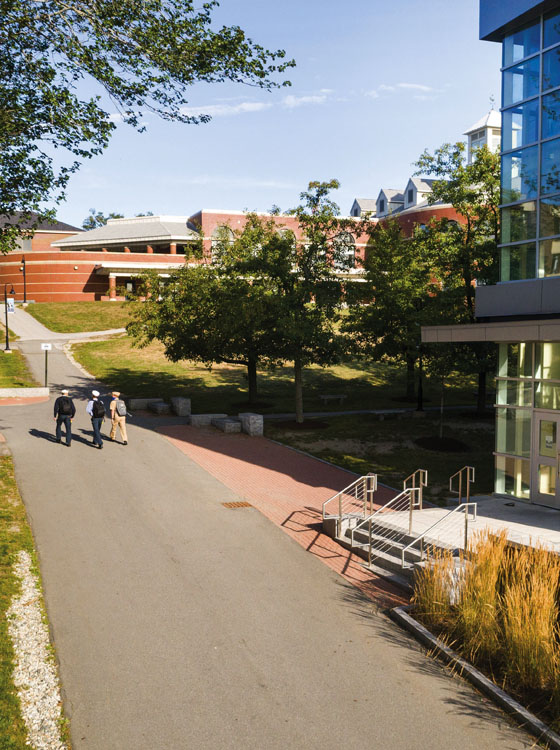
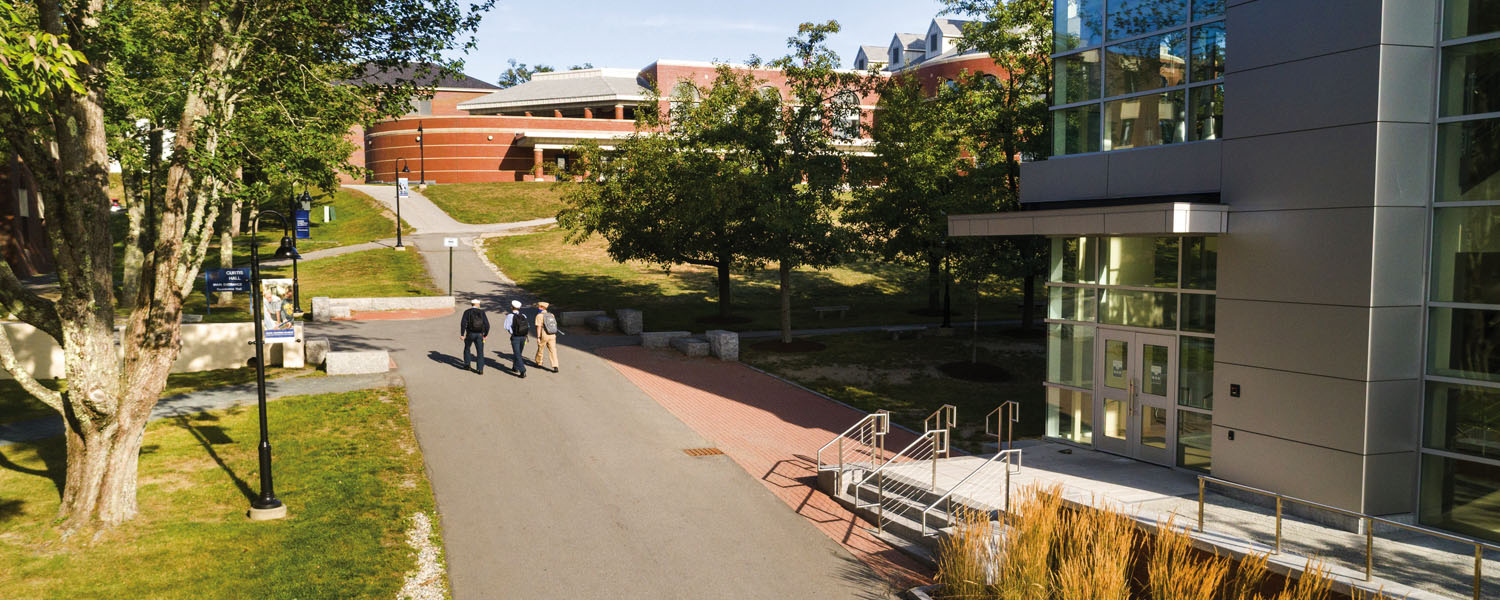



Post Comment
Comments are moderated and will be reviewed prior to posting online. Please be aware that when you submit a comment, you agree to the following rules:
Maine Maritime Academy reserves the right to delete any comment that does not comply with these guidelines and is not responsible or liable in any way for comments posted by its users. If you have a message for the editor, please email mariner@mma.edu.
Features
View All >Read More
Read More
Castine, Maine 04420All Rights Reserved © 2025
Privacy Policy & Terms
Web issue? Contact Webmaster